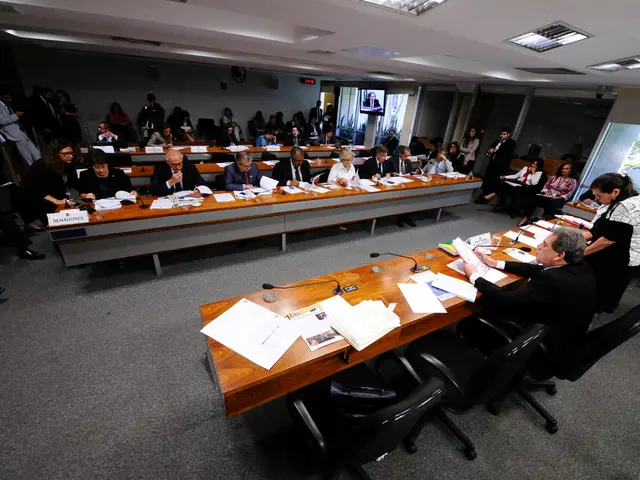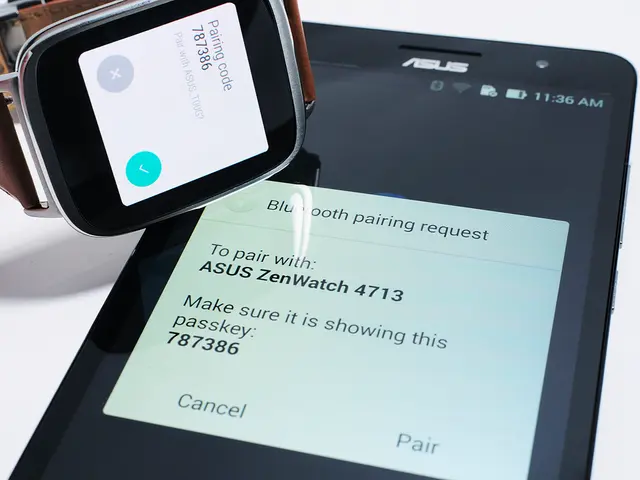Government Motors Seeks Government Subsidies to Increase Private Purchase of Electric Vehicles (EVs)
================================================================================
In the heart of Lower Saxony, the Volkswagen plant in East Frisia exclusively produces electric cars, with the ID.7 Tourer leading the charge and being the most frequently registered electric vehicle in Germany during the first half of 2025. This positive development has not gone unnoticed, as Lower Saxony's Minister President Olaf Lies views Volkswagen's electric car production in Emden positively [1].
However, Volkswagen faces significant challenges in boosting private demand for electric cars. One of the main issues is intense competition from rivals such as Tesla and increasingly strong Chinese EV brands expanding into Europe [2]. Furthermore, some electric models, like the ID.7 sedan, are not available in global markets such as North America, limiting VW’s broader demand growth and variety for buyers [2].
Economic headwinds and tariffs also pose a threat. U.S. tariffs have significantly impacted Volkswagen’s profitability, costing €1.3 billion in the first half of 2025, which may constrain resources available for EV promotion and innovation [3]. The legacy of the Dieselgate scandal and slow start with buggy EV software have eroded trust and affected initial consumer interest, requiring persistent strategic efforts to rebuild confidence [5].
To address these challenges, Volkswagen is employing a multi-pronged approach. The company continues to lead in EV model deliveries and registrations domestically and in Europe [1][3]. They are enhancing product appeal via range improvements and model diversity within the ID. family [1]. Strategic presence in core markets is maintained while managing geographic offerings carefully due to market-specific factors [2]. Lastly, the company is navigating trade challenges and investing in marketing to shore up consumer trust post-Dieselgate [5].
Sales Director Martin Sander expressed the need for clear signals and targeted state funding to reduce skepticism among private buyers. The state funding being advocated for is aimed at reducing skepticism and boosting demand for electric cars among private buyers [6]. Olaf Lies, the SPD politician, praises the ID.7 Tourer as proof of the state's transformational capability [7].
Experts caution that the slow development of electric cars is an important factor in the overall crisis in the German automotive industry [8]. Despite these challenges, Volkswagen's focus on its ID. family is paying off, and the company is successfully growing private demand for electric cars in Germany [1][2][3][5].
References:
[1] Volkswagen AG. (2025). Volkswagen delivers 1.5 million ID. models worldwide. [Press release]
[2] Reuters. (2025). Volkswagen's ID.7 sedan not available in North America, limiting demand growth. [News article]
[3] Financial Times. (2025). US tariffs cost Volkswagen €1.3 billion in H1 2025. [News article]
[4] European Automobile Manufacturers' Association. (2025). BEV sales growing in Europe, but overall market slightly contracting. [Press release]
[5] Volkswagen AG. (2023). Volkswagen rebuilds trust post-Dieselgate. [Press release]
[6] Handelsblatt. (2025). Volkswagen calls for state support to boost private demand for electric cars. [News article]
[7] NDR. (2025). Olaf Lies praises ID.7 Tourer as proof of Lower Saxony's transformational capability. [News article]
[8] Spiegel Online. (2025). Slow development of electric cars contributing to crisis in German automotive industry. [News article]
Read also:
- EA Relies on Madden and Battlefield to Drive Microtransactions Recovery
- Expense for Creating a Digital Platform for Fantasy Sports
- AI-Enhanced Battery-Swapping Station in Southeast Asia Officially Opens Its Doors
- Honda unveils blueprint for design, advanced driver assistance systems, electric vehicles, fuel efficiency, and technology development








